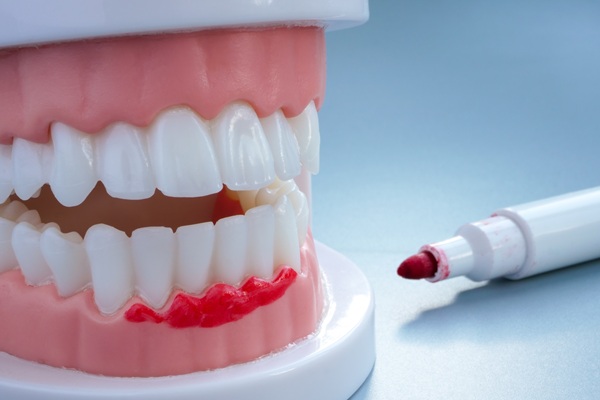Treating Gum Disease If You Have Gingivitis

Gingivitis is a form of gum disease that causes swelling where the gums meet the teeth. It is a serious condition that should be treated as soon as possible. Early diagnosis and treatment can prevent further oral health issues, including oral functions, loose teeth, and potential tooth loss.
Causes and symptoms of gingivitis
Gingivitis can occur when plaque is not properly removed and starts to build up on teeth. Over time, the sticky film can harden into a substance known as tartar, which can only be removed during a professional cleaning by a dentist or dental hygienist.
Common symptoms of gingivitis include bleeding or swollen gums, persistent bad breath, receding gums, and sensitive teeth. When experiencing these symptoms, it is important to see a dental professional immediately. Gingivitis must be treated to prevent further decay of the teeth and the risk of gum infection. When left unaddressed, it can also lead to other health issues.
Treating gingivitis
Fortunately, treating gingivitis can reverse symptoms, though it cannot restore damage to the bone that has already occurred. The typical treatment plan includes cleaning, dental restoration, and ongoing care.
Professional cleaning
The professional cleaning removes any tartar and plaque that has built up on the teeth. This is accomplished by scaling and root planing. Scaling removes tartar and bacteria, while root planing smooths root surfaces and removes bacterial products causing inflammation. To perform these tasks, the professional may use a laser or ultrasonic device.
Restoration
If restoration is advised, any issues that make caring for the teeth more difficult can be corrected. This includes straightening teeth and replacing crowns and other dental fixtures.
Preventing future gum infection
Gingivitis is preventable. There are many factors that contribute to the condition, and knowing the causes can help stop future episodes of gum disease. These preventative measures and habits to avoid can maintain good gum health:
- Brush teeth at least two times a day
- Floss teeth at least once a day
- Avoid smoking and other tobacco products
- Use an electric toothbrush with soft bristles for a better cleaning
- Avoid overconsumption of sugary and acidic food and drinks
- Replace toothbrushes or electric toothbrush heads every three months
- Schedule a regular dental checkup once a year
Using mouthwash can reduce bacteria and keep breath smelling good. A natural mouthwash that can be made at home is a saltwater rinse. Because salt is a natural disinfectant, it can help heal gums that have become inflamed. It may also reduce the amount of bacteria in the mouth.
Schedule your next dental visit to prevent gingivitis
Gingivitis is a preventable oral health condition. By following a thorough oral health routine and avoiding the overuse of sugar and tobacco products, your teeth and gums are more likely to stay healthy. If you have been experiencing bleeding or swollen gums, you should make an appointment with a dental professional as soon as possible to prevent further health issues. Call our Palm Beach Gardens office to learn more or schedule your next visit.
Request an appointment here: https://gardensdentist.com or call Quasha Dentistry at (561) 220-0225 for an appointment in our Palm Beach Gardens office.
Check out what others are saying about our dental services on Yelp: Gum Disease in Palm Beach Gardens, FL.
Related Posts
Emergency dentists will often try every possible avenue before deciding you need a tooth extraction. This procedure can reduce the risk of an infection from spreading and worsening pain. By removing the affected tooth, our team can relieve your symptoms and preserve your oral and overall health.A deep crack or break that extends under the…
A smile makeover can transform not only the appearance of teeth, but also the way a person feels in social and professional settings. When the color, shape, or alignment of teeth causes hesitation, a smile makeover offers a structured way to address those concerns. Modern cosmetic dentistry combines art and science to create natural-looking improvements…
Dental restorations can help you maintain your oral health and prevent further decay. A dental filling is one of the most common restorative procedures used to treat mild to moderate cavities and other dental damage. This type of restoration restores the function and appearance of a damaged or decayed tooth. Let us walk you through…
Those missing one or more molars may benefit from dental implants. The molars are the large, flat teeth in the back of your mouth, used to grind your food when chewing. Not counting your wisdom teeth, you have eight molars in your mouth, all of which play an important part in your ability to chew…
